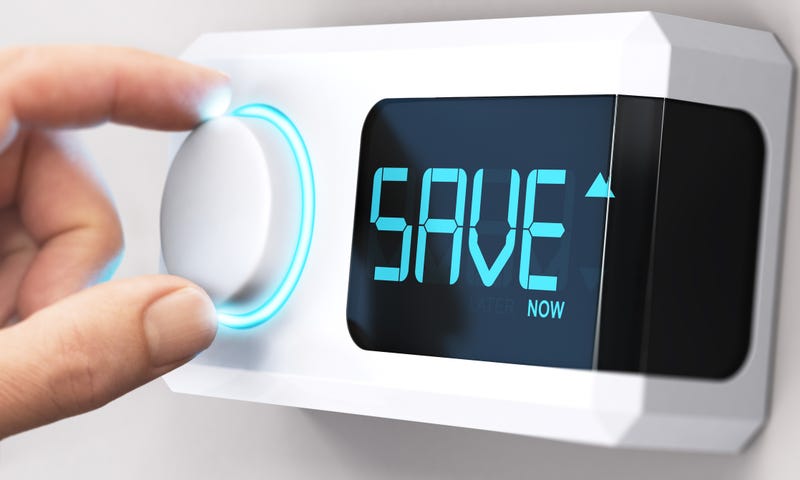
The winter chill is settling in and many of us find ourselves reaching for the thermostat to keep our homes warm and cozy. However, natural gas and electricity prices are on the rise so the cost can quickly add up, leaving us with hefty utility bills at the end of the season.
Fear not! There are plenty of strategies you can employ to save on your heating bill without sacrificing comfort. In this blog post, we'll explore:
- Ten smart ways to cut down on your heating expenses
- How to recognize signs of an inefficient heating system
- When it's time to call in the professionals
Aquarius Home Services is your go-to heating and cooling company with 16 offices across Minnesota and Wisconsin. If you find your home is not staying warm enough in winter, give them a call as you may have a problem with your heating system.
1) Programmable Thermostat
One of the most effective ways to save on heating costs is by installing a programmable thermostat. These devices allow you to set different temperature levels for different times of the day, ensuring your heating system isn't working harder than it needs to. Why should the heat be at full blast when you’re not even home or awake? Programmable thermostats keep the house comfy when you’re at home and awake, but let the temperature drop slightly at night and midday.
2) Seal Drafts
Inspect your home for drafts around windows, doors, and any other openings. Seal these gaps with weather stripping or caulking to prevent cold air from entering and warm air from escaping. Simple solutions like draft stoppers for doors can make a big difference.
3) Insulate Your Home
Proper insulation is key to maintaining a warm and energy-efficient home. Ensure your attic, walls, and basement are adequately air sealed and insulated. Investing in insulation upgrades can pay off in the long run by reducing your heating costs significantly. Insulation investments can usually break even in 2-3 years. Keep in mind that insulation also helps you home stay cool in the summer!
4) Regular Maintenance
Don't neglect your heating system's maintenance. Change air filters regularly, as clogged filters can impede airflow and force your furnace to work harder. Schedule an annual furnace tune-up to keep your heating system running efficiently.
5) Use Curtains and Blinds
Use heavy curtains or blinds to your advantage. Open them during the day to allow sunlight to naturally warm your home, and close them at night to trap heat and prevent drafts. The inverse applies in summer. Keep them closed during the day so the sun doesn’t heat up your home needlessly.
6) Zone Heating
If your home has multiple heating zones, use them wisely. Focus on heating the rooms you use most frequently and keep the doors closed in less-used areas to prevent heat from spreading to parts of the home where it’s not needed. For example, if you have an upper level that you rarely use, find a way to cordon off that section of the house. If there is a door to the upper level, keep it closed and put a draft stopper on the door. Heat will simply be rising and escaping through your upper level which is just money and energy wasted.
7) Lower the Thermostat When You're Away
When you're away from home for an extended period, lower the thermostat to a cooler, but not freezing, temperature. You only need to keep it warm enough to prevent your pipes freezing. Lowering the thermostat to 60F greatly reduces the time your heating system runs and conserves energy.
8) Invest in Energy-Efficient Appliances
If it's time to replace your appliances such as water heaters, dishwashers, and washing machines, consider energy-efficient options. Look for appliances with the ENERGY STAR label, as they are designed to consume less energy while providing the same level of comfort.
9) Use Space Heaters Sparingly
While space heaters can be useful for heating small areas, they are much less energy efficient than central heating systems. If you use them, do so sparingly and turn them off when not needed.
10) Upgrade to a High-Efficiency Heating System
If your heating system is old and inefficient, it may be time for an upgrade. Modern high-efficiency furnaces and boilers can significantly reduce your heating costs while improving your home's comfort.
Signs Your Heating System Is Inefficient
Recognizing signs of an inefficient heating system is crucial to addressing problems promptly and avoiding further energy waste and costly repairs. Here are some common signs to watch out for:
- Higher Energy Bills: A sudden and unexplained increase in your heating bills often indicates that something is wrong with your heating system.
- Uneven Heating: If some rooms in your home are significantly colder than others, it could be a sign of poor air distribution, inadequate insulation, or a malfunctioning heating system.
- Frequent Cycling: If your heating system turns on and off frequently, it might be struggling to maintain the desired temperature, resulting in energy wastage.
- Strange Noises: Unusual sounds such as banging, clanging, or rattling from your heating system can indicate mechanical issues that reduce efficiency.
- Inconsistent Heating: If your heating system struggles to keep your home consistently warm or takes an unusually long time to reach the desired temperature, it may be inefficient or need repairs.
When to Call a Professional

While some heating system issues can be resolved with simple maintenance tasks, others may require the expertise of a professional HVAC technician. Here are situations in which you should consider calling in a pro:
- Annual Maintenance: Schedule an annual tune-up with a qualified technician to ensure your heating system is running efficiently and identify potential problems before they escalate.
- No Heat: If your heating system stops producing heat altogether, it's time to call for professional help. This could be due to various issues, including a malfunctioning thermostat, a faulty pilot light, or a more significant system problem.
- Strange Odors: Unusual smells, especially burning or gas odors, should never be ignored. These could indicate a serious problem, such as a gas leak or an electrical issue, which requires immediate attention.
- Pilot Light Problems: If you have a gas furnace and the pilot light frequently goes out or appears yellow instead of blue, it's a sign of potential issues that should be addressed by a professional.
- Unusual Sounds: As mentioned earlier, strange noises from your heating system can signal mechanical problems. Don't delay in calling a technician to diagnose and repair the issue.
- Frequent Repairs: If you find yourself repeatedly needing repairs or if your heating system is aging and inefficient, replacing it with a newer, more efficient model may be more cost-effective in the long run.
Get a Good Heating and Cooling System
Winter is in full swing so keeping your home warm without breaking the bank is essential. Implementing these ten smart strategies to save on your heating bill can significantly affect your energy expenses. Additionally, being vigilant about the signs of an inefficient heating system and knowing when to call in a professional can help you maintain a warm, comfortable, cost-effective home throughout the winter.
Aquarius Home Services has tons of options to choose from to replace your home’s comfort systems and is offering Buy Now, Pay Later financing through 3/31/24, that offers the option to delay payments until 2025.Need a helping hand?
Contact Aquarius Home Services today to lower your energy costs!
